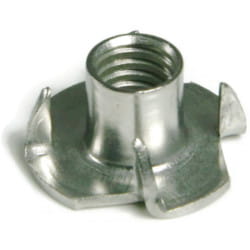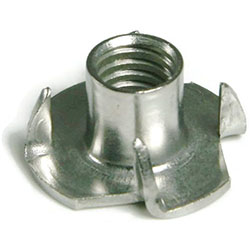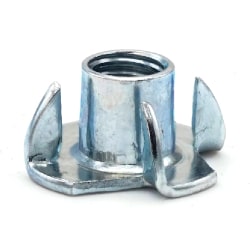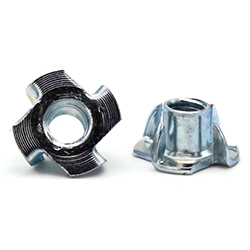Tee Nuts are commonly used within furniture applications. The prongs within the head bite into materials such as wood and composite to prevent rotation and provide a flush finish. T nuts, commonly called tee nuts and blind nuts, are used in wood, composite, particle or other soft materials. Made from an internal threaded barrel and flange, t nuts have small prongs (usually 3 or 4) that dig into the soft installation surface. They can sometimes be serrated to provide a better grip. The prongs of a tee nut act as hooks to hold the nut to the surface leaving a flush face on the nut side, as long as the bolt is the right length.
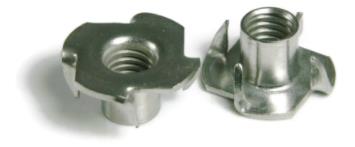
| Metric : | Dia M4 - M10 |
|---|---|
| Imperial : | Dia #10-24 - 3/8" |
| Threads : | Metric Coarse & Imperial BSW, UNC |
| Strength : | Mild Steel & A2-70 |
| Material/Finish : | Plain, Zinc Plated & Stainless Steel |
Installing a T nut is a simple process. First, a drill bit that is just wider than the diameter of the barrel of the blind nut is used to drill a hole in the soft material. Next, the nut can be either pushed or lightly tapped with a hammer, so the prongs begin to dig into the material. Then, feed the bolt through the other side and thread it into the t nut. Finally, tighten the bolt. As the bolt is being tightened, the nut will be pulled into the soft material until flush against the material surface.
A tee nut and bolt will provide better retention in wood over time then wood screws will. Due to the nature of the prongs, they are unlikely to vibrate loose. Although the bolt may loosen over time due to vibrations, simply revisiting and tightening the bolt will retighten the nut anyway. Since the small prongs are what digs into the material, the material is less likely to split or crack.
18-8 or 304 grades of Stainless steel are suitable for many general purpose applications, especially freshwater and non-salt water wet environments. Corrosion-resistant and durable, 18-8 stainless steel is equivalent to the A2 grade of stainless steel.
Zinc is by far the most common and economical type of plating for fasteners. The zinc plating adds a protective "sacrificial" top layer against corrosion while also adding a shiny finish to the fastener. Zinc plating is ideal for indoor use where it won't be constantly exposed to harsh elements.
